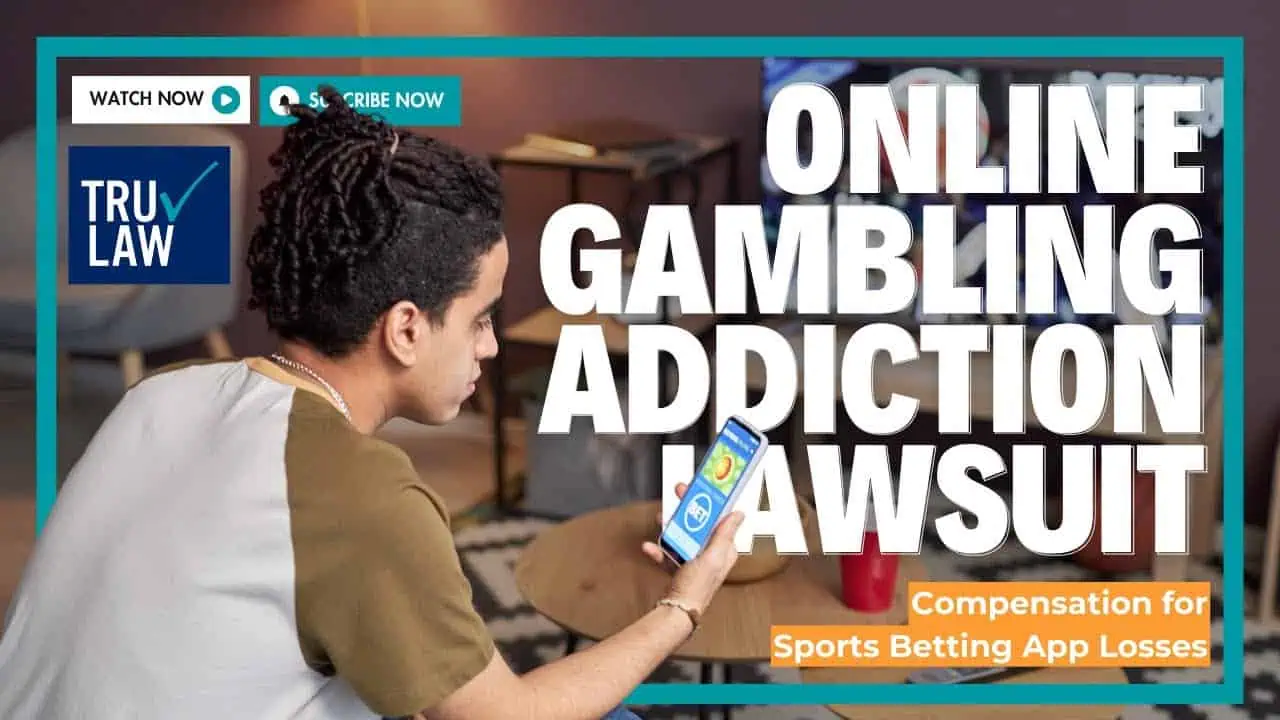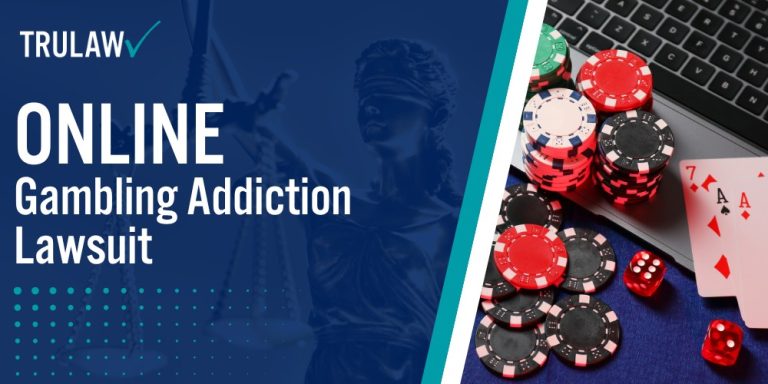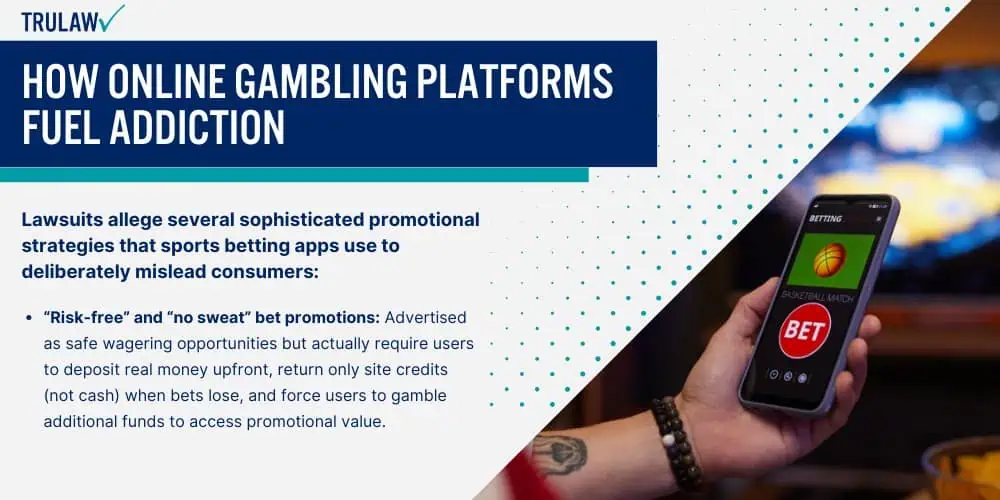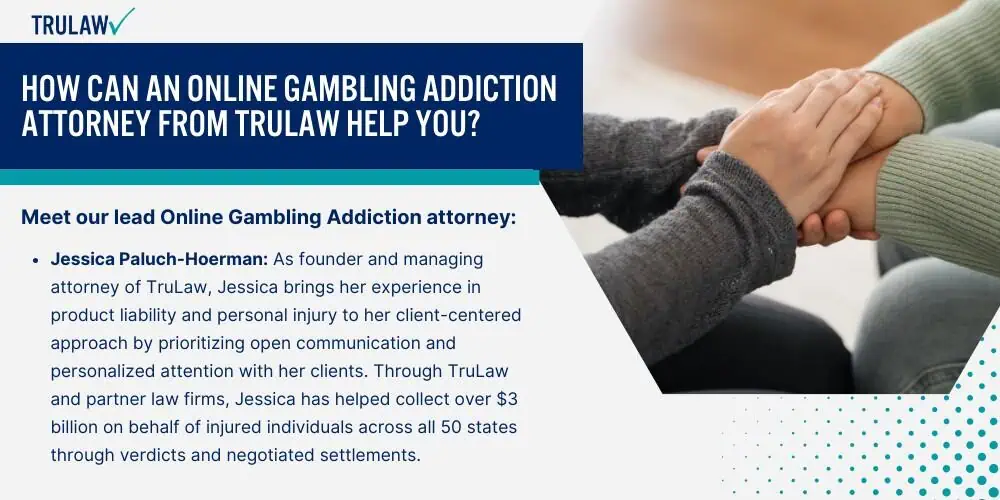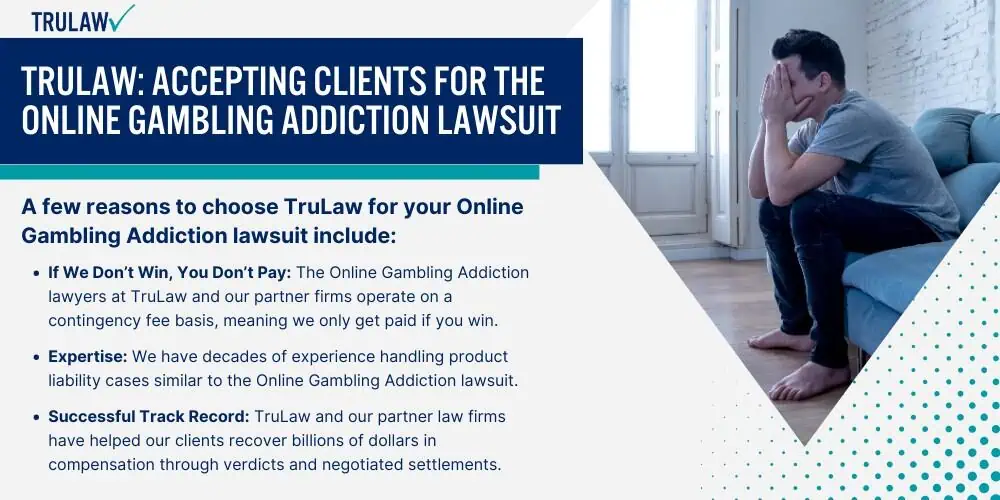The allegations against these platforms center on systematic exploitation enabled by data analytics.
Companies track loss-chasing behavior, late-night login patterns, deposit frequency, and reaction to promotional offers to create detailed user profiles.
Rather than using this information to protect vulnerable users – as responsible gambling principles require – lawsuits allege platforms weaponize the data to identify their most profitable customers: those with problem gambling behaviors.
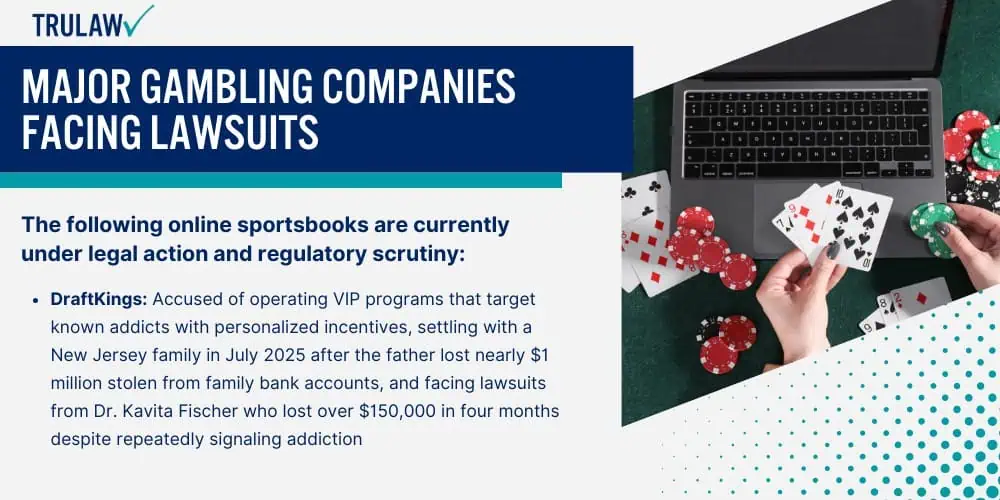
DraftKings’ VIP program, called “Dynasty Rewards,” assigns personal account managers to high-value users who demonstrate the spending patterns characteristic of addiction.
These hosts provide opulent gifts including luxury vacations, high-end electronics, and exclusive event access.
The following online sportsbooks are currently under legal action and regulatory scrutiny:
- DraftKings: Accused of operating VIP programs that target known addicts with personalized incentives, settling with a New Jersey family in July 2025 after the father lost nearly $1 million stolen from family bank accounts, and facing lawsuits from Dr. Kavita Fischer who lost over $150,000 in four months despite repeatedly signaling addiction
- FanDuel: Defending against claims in California that daily fantasy sports contests violate state gambling laws, facing allegations from former Jacksonville Jaguars employee Amit Patel who embezzled nearly $20 million while FanDuel allegedly provided luxury incentives, and named in the Baltimore municipal lawsuit for exploiting vulnerable users
- Caesars Sportsbook: Faced backlash for their controversial partnership with Michigan State University was terminated in 2023 after using aggressive promotional tactics and VIP program offerings targeted at college students on campus
- BetMGM: Subject to lawsuits from self-identified compulsive gamblers alleging the platform encouraged tens of millions of dollars in wagers despite obvious addiction signs
- Bet365, Fanatics, and ESPN Bet: Under investigation for marketing practices targeting college students and young adults, with concerns about youth gambling addiction
One plaintiff reported having four VIP hosts simultaneously encouraging compulsive betting, while his deposits reached 440% of his annual salary.
The question at the heart of litigation: Do companies have a duty to intervene when their own data reveals addiction, or can they legally profit from users’ inability to control their behavior?
The City of Baltimore’s lawsuit filed on April 3, 2025, represents a novel legal approach using municipal consumer protection ordinances.
The complaint alleges Marylanders placed over $457 million in bets on DraftKings and FanDuel in January 2025 alone, with the platforms collecting massive amounts of user data specifically to identify patterns like “loss chasing” and excessive betting behaviors.
The lawsuit seeks $1,000 penalties for each time the companies targeted users showing signs of problematic gambling.
This data collection directly correlates with a documented public health trend: A UC San Diego study published in JAMA Internal Medicine found a 23% increase in search data for gambling addiction assistance since the 2018 Murphy v. NCAA Supreme Court decision through June 2024.
The research analyzed internet searches for phrases like “am I addicted to gambling,” documenting approximately 6.5 to 7.3 million searches total for gambling addiction resources nationwide, with search volumes reaching a peak of 180,000 monthly searches.
If you lost substantial amounts of money on DraftKings, FanDuel, or other major gambling platforms while receiving VIP incentives or promotional offers, you may be entitled to pursue compensation.
Contact TruLaw using the chat on this page to receive a free consultation and determine whether you qualify to join others in filing a Gambling Addiction Lawsuit today.
Recent Settlements and Verdicts in Gambling Addiction Cases
These substantial legal resolutions demonstrate both the viability and value of gambling addiction claims:
- DoubleDown Interactive: $415 million class action settlement (2022) resolved claims the social casino violated Washington gambling laws by selling virtual chips with real money, with settlement payments reaching nearly $6,000 for users who spent substantial amounts on free to play mobile games
- DraftKings New Jersey settlement (July 2025): Confidential settlement with Lisa D’Alessandro after her ex-husband lost approximately $942,000 over four years, including money stolen from children’s savings accounts, while DraftKings provided VIP perks despite clear addiction signs and gambling debt
- DraftKings Pennsylvania settlement: Dr. Kavita Fischer reached confidential settlement in July 2025 after losing more than $150,000 in four months while DraftKings continued offering incentives despite her expressing concerns about gambling within her means
- VGW settlement: $11.75 million for Kentucky users of Chumba Casino and LuckyLand Slots social casinos
- Zynga online casino: $12 million settlement for misleading virtual currency practices
These settlements establish precedent showing courts recognize gambling companies bear responsibility when they actively exploit addicted users rather than passively permitting them to legally gamble.
The settlements also reveal factors that increase case value: documented communication with VIP hosts showing company knowledge of addiction, dramatic escalation in deposits that should have triggered investigations, evidence of money obtained through theft or embezzlement to fund gambling, and severe consequences including relationship dissolution or suicide attempts.
Settlement amounts generally reflect the totality of losses plus compensation for emotional distress and life disruption.
While some cases settle for amounts approximating documented losses, others include substantial additional compensation when evidence shows particularly egregious conduct.
The presence of VIP host communications often strengthens cases substantially because they demonstrate the company’s active participation in fostering addiction rather than merely providing a platform.
The trajectory of litigation suggests increasing willingness to hold platforms accountable.
As more internal documents surface through discovery revealing executives’ knowledge about addiction risks and deliberate decisions to prioritize revenue over user protection, plaintiffs’ attorneys anticipate larger settlements and potential jury verdicts that include punitive damages.
The next wave of cases may benefit from established precedent and discovery findings that expose industry-wide practices.
